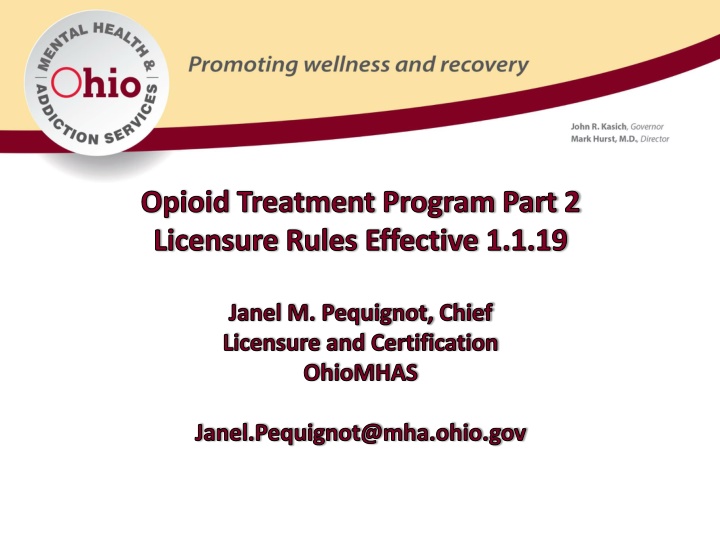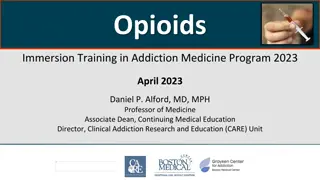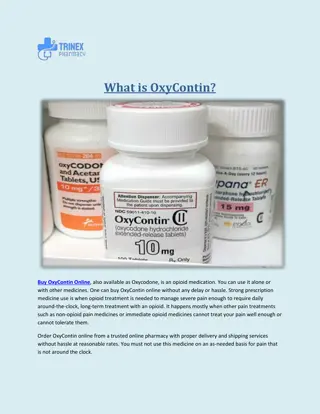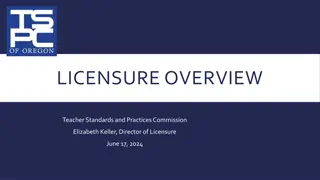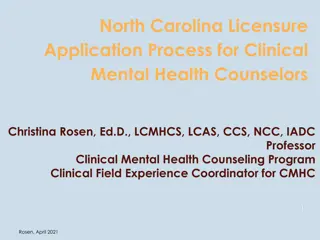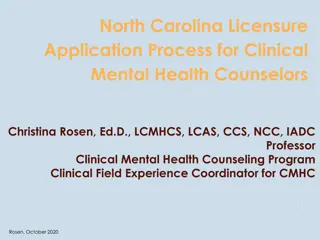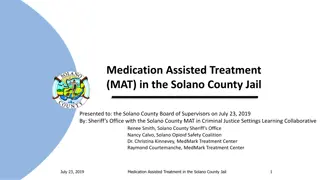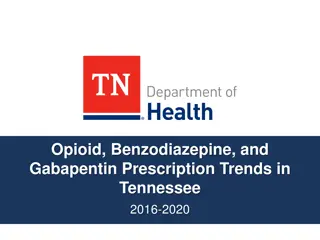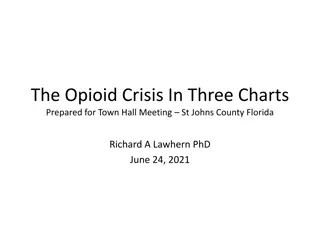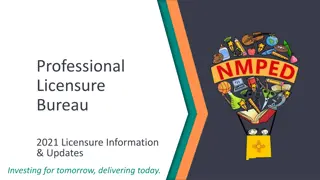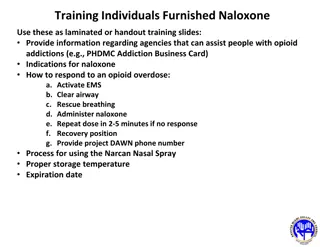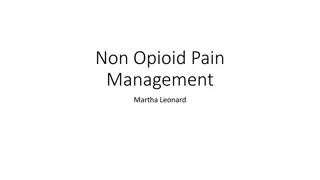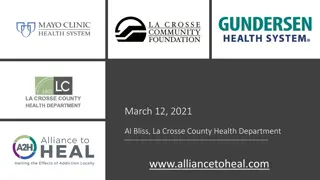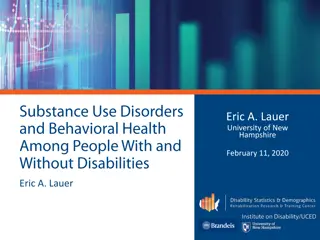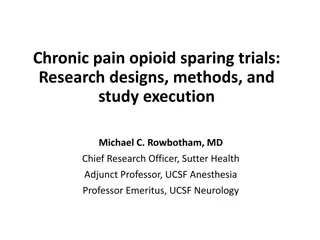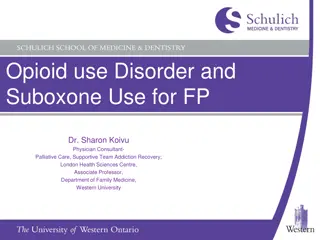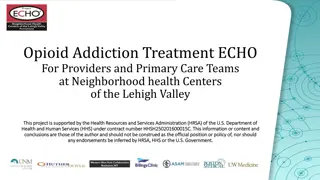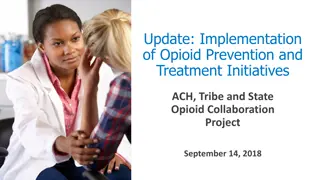OhioMHAS Opioid Treatment Program Licensure Rules Webinar
Learn about the new Opioid Treatment Program Part 2 Licensure Rules effective 1.1.19 in Ohio. Join Chief Janel M. Pequignot from OhioMHAS as she shares important information on how to participate in today's webinar. Download or print attachments and stay informed about the latest updates in opioid treatment regulations.
Download Presentation

Please find below an Image/Link to download the presentation.
The content on the website is provided AS IS for your information and personal use only. It may not be sold, licensed, or shared on other websites without obtaining consent from the author.If you encounter any issues during the download, it is possible that the publisher has removed the file from their server.
You are allowed to download the files provided on this website for personal or commercial use, subject to the condition that they are used lawfully. All files are the property of their respective owners.
The content on the website is provided AS IS for your information and personal use only. It may not be sold, licensed, or shared on other websites without obtaining consent from the author.
E N D
Presentation Transcript
Opioid Treatment Program Part 2 Licensure Rules Effective 1.1.19 Janel M. Pequignot, Chief Licensure and Certification OhioMHAS Janel.Pequignot@mha.ohio.gov
How to Participate in Todays Webinar 1. Download or print attachments from your control panel. 2. Type questions in the Question box of your control panel and send them. 3. For questions about specific rules, it is helpful to include the rule and paragraph - ex: 02 (B)(2)(i). 4. At end of each section, MHAS will read and answer questions submitted in writing. 5. Time permitting, will allow individuals to ask questions or make comments verbally at end of webinar. You will need to raise your hand on your control panel. You must be connected to audio via phone or microphone.
What This Webinar Will and Will Not Cover Will Cover 1. OAC Chapter 5122-40 Opioid Treatment Program License Regulations Effective Date 1 January 2019 Will NOT Cover 1. Review of OAC Chapters 5122-24 through 5122-29 (Certification standards) 2. Federal or other state agency regulations & processes 3. How to use Methadone or Buprenorphine to treat opiate addiction 4. Clinical practices
Licensure vs. Certification OhioMHAS Licenses the following provider types: 1. Methadone programs 2. Opioid treatment programs (beginning 6/29/19) 3. Private psychiatric inpatient hospitals 4. MH residential facilities OhioMHAS Certifies the following provider types: 1. SUD & MH Outpatient treatment 2. SUD Residential 3. Prevention 4. Driver Intervention Programs
Big Ticket Changes 1. Requires licensure of SAMSHA Certified (non- methadone) Opioid Treatment Programs 2. Updating some portions of rules for clarity, to improve and assure quality, and in response to provider feedback 3. New rule OAC 5122-40-15 Medication Units
Ohio Revised Code Amended June 29, 2018 5119.391 Methadone Treatment License 5119.392 Methadone Treatment Locations Amended June 29, 2018 and Repealed Effective June 29, 2019 5119.37 Requirements to Operate Opioid Addiction Treatment Programs 5119.371 Location of Opioid Treatment Programs
Who Else Regulates OTPs? 1. Board of Pharmacy (TDDD) 2. SAMSHA 3. DEA 4. CARF/TJC/COA (accreditation)
OAC Rule 5122-40-06 Medication Assisted Treatment Administration
Key Concepts Standards for prescribing, administering and dispensing medications in accordance with state and federal laws Take-home doses Guest dosing Interim maintenance Pregnant patients
5122-40-06 (A)(B)(C)(D) (A) Methadone Medication administration shall consist of face-to-face interactions with patients, and methadone medication shall only be administered or dispensed in oral, liquid doses. (B) Methadone medication Medication assisted treatment administration shall be provided in a manner to ensure privacy. (C) Methadone medication shall only be administered orally. (D) Methadone medication Opioid treatment programs are permitted to establish medication units following the guidelines of 42 CFR part 8 subsection 8.11(i)(1).
5122-40-06 (E) (E) Methadone administration Administration of medication assisted treatment shall be provided by individuals who have one or more of the following credentials from the applicable state of Ohio board: (1) Licensed physician; (2) Pharmacist who is authorized to manage drug therapy pursuant section 4729.39 of the Revised Code but only if specifically authorized by a consult agreement and to the extent specified in the agreement; (3) Registered nurse; (4) Licensed practical nurse who has proof of completion of a course in medication administration approved by the Ohio board of nursing; or, (5) Physician assistant who has proof of completion of a course in medication administration approved by the state medical board of Ohio.
5122-40-06 (F) (F) Dispensing or personally furnishing methadone medication assisted treatment shall be performed in accordance with rules adopted by the state board of pharmacy and may only be done by individuals who have one or more of the following credentials from the applicable state of Ohio board: (1) Licensed physician; or, (2) Pharmacist pursuant to section 4729.39 of the Revised Code.; or, (3) Certified nurse practitioner with an exemption request approved by SAMHSA and the state authority.
5122-40-06 (G)(H) (G) Providers of methadone medication administration services shall be supervised by individuals who have one of the following credentials from the applicable state of Ohio board: (1) Licensed physician; or, (2) Registered nurse. (H) A written, signed, and dated physician's order shall be required and a copy maintained in the patient's record, for all methadone medication administered, personally furnished, or dispensed. The prescribing physician must be a staff member or contract employee of the methadone program.
5122-40-06 (I) (I) Labels for dispensing or personally furnishing methadone medication assisted treatment shall be prepared in accordance with 21 C.F.R. 1306.14 and section 3719.08 of the Revised Code and in accordance with Chapter 4729. of the Administrative Code.
5122-40-06 (J) (J) Methadone Medication assisted treatment orders shall be written by a program physicianprescriber who is licensed by the Ohio state medical board and registered with the U.S. drug enforcement administration to order methadone. The following procedures shall be followed in writing physician orders for methadone. (1) A physician'sprescriber's order for methadonemedication assisted treatment shall be valid for a maximum time period of ninety days. (2) A physician'sprescriber's order for methadone medication assisted treatment shall be reviewed at least every ninety days and adjusted, reordered, or a notation made that methadone the medication is to be discontinued.
5122-40-06 (K) (K) Methadone Opioid treatment programs shall be open and administer medication at least six days per week every week, except that programs may close on federal holidays indicated in paragraph (N) of this rule. Upon approval of an exception request from the state authority and SAMHSA, opioid treatment programs may close for one business day twice per year for administrative planning purposes. Closure dates may not be within the same sixth month period.
5122-40-06 (L) (L) The take-home supply for patients enrolled in the methadone program an opioid treatment program receiving methadone during the first ninety days of treatment is limited to a single dose each week. The patient shall ingest all other doses under appropriate supervision in accordance with 42 CFR 8.12 (i)(3). At the discretion of the medical director or other authorized program physician, a patient may receive one additional take-home dose for those holidays listed in paragraph (N) of this rule if the methadone opioid treatment program is closed in observance of the holiday.
5122-40-06 (M) (M) The take-home supply for patients enrolled in an opioid treatment program receiving partial opioid agonist during the first ninety days of treatment is limited to a 14 days supply. After the first 90 days of treatment, the amount of take-home supply may never exceed one month.
5122-40-06 (N) (N) Take-home doses of medication for medication assisted treatment shall not be permitted for clients who are on short-term opiate detoxification except on federal holidays and Sundays if the program is closed. 5122-40-01 (A)(19) "Short-term detoxification" means the administering of a methadone medication assisted treatment for detoxification of a patient for a period not to exceed thirty days.
5122-40-06 (O) (O) If the methadone opioid treatment program is closed for any of the following federal holidays, all patients receiving methadone may be given a one-day take-home dose at the discretion of the medical director. (1) Thanksgiving day. (2) Christmas day. (3) New year's day. (4) Martin Luther King day. (5) President's day (6) Memorial day (7) Fourth of July (8) Labor day (9) Columbus day (10) Veteran s day
5122-40-06 (P) (P) The opioid treatment program shall have written procedures for take-home methadone medication assisted treatment doses that include: (1) Statement that the methadone opioid treatment program decisions on dispensing take-home doses of methadone medication shall be determined by the medical director or other authorized program physician; (2) Statement that a take-home dose of methadone medication is an earned privilege and not a right; (3) Requirement that take-home doses of methadone medication shall be given only to a methadone patient, who, in the opinion of the medical director or other authorized program physician, is responsible in handling opiate drugs medication;
5122-40-06 (P) (continued) (P) The opioid treatment program shall have written procedures for take-home medication assisted treatment doses that include: (4) Except during program closure on Sundays and federal holidays listed in paragraph (N) of this rule, a statement that before a medical director or other authorized program physician authorizes take-home doses of methadone medication medications used for medication assisted treatment, the medical director or other authorized program physician shall record the rationale for this decision in the patient's clinical record and consider, at a minimum, the following criteria: (a) Absence of recent abuse of opioid or other drugs and alcohol;
5122-40-06 (P) (continued) (P) The opioid treatment program shall have written procedures for take-home medication assisted treatment doses that include: (4) Except during program closure on Sundays and federal holidays listed in paragraph (N) of this rule, a statement that before a medical director or other authorized program physician authorizes take-home doses of medications used for medication assisted treatment, the medical director or other authorized program physician shall record the rationale for this decision in the patient's clinical record and consider, at a minimum, the following criteria: (b) Regularity of clinic attendance for methadone medication administration; (c) Regularity of clinic attendance for counseling sessions; (d) Absence of serious behavioral problems at the clinic; (e) Absence of known recent criminal activity, for example, drug dealing; (f) Stability of the patient's home environment; (g) Stability of the patient's social relationships; (h) Length of time in comprehensive maintenance treatment;
5122-40-06 (P) (continued) (P) The opioid treatment program shall have written procedures for take-home medication assisted treatment doses that include: (4) Except during program closure on Sundays and federal holidays listed in paragraph (N) of this rule, a statement that before a medical director or other authorized program physician authorizes take-home doses of medications used for medication assisted treatment, the medical director or other authorized program physician shall record the rationale for this decision in the patient's clinical record and consider, at a minimum, the following criteria: (i) Assurance that take-home doses of methadone can be safely stored within the patient's home; (j) Determination if the rehabilitation benefit to the patient by receiving a take-home dose of methadone medication assisted treatment outweighs the potential risks of diversion; and, (k) Employment status of patient. (5) Statement that physician orders for take-home methadone medication for substance use disorders shall expire every ninety days;
5122-40-06 (P) (continued) (P) The opioid treatment program shall have written procedures for take-home medication assisted treatment doses that include: (6) Requirement that education on the proper safe storage and disposal of take-home medication be provided to patients prior to the first take-home dose. (7) Requirement that child-resistant packaging and or caps be used for take-home doses of methadone medication medications for substance use disorders; and, (a) If a take-home bottle or other form of packaging is returned by a patient for refills, the methadone opioid treatment program shall accept the bottle or other form of packaging and dispose of it.
5122-40-06 (P) (continued) (P) The opioid treatment program shall have written procedures for take-home medication assisted treatment doses that include: (7) Requirement that child-resistant packaging or caps be used for take-home doses of medications for substance use disorders; and, (b) If a take-home bottle or other form of packaging is utilized for take home doses, the medication bottles Bottles used for take-home doses of methadone medication shall only be used once. (c) Under no circumstance is methadone medication to be placed in a container provided by a patient (including previous take-home bottle).
5122-40-06 (P) (continued) (P) The opioid treatment program shall have written procedures for take-home medication assisted treatment doses that include: (8) Requirement that each take-home bottle or other form of methadone medication packaging used for medication assisted treatment dispensed or personally furnished have a label that contains the following information: (a) The methadone opioid treatment program's name, address and telephone number; (b) Name of patient; (c) Name of program physician prescribing the methadone medication; (d) The name of the methadone medication; (e) The dosing instructions and schedule;
5122-40-06 (P) (continued) (P) The opioid treatment program shall have written procedures for take-home medication assisted treatment doses that include: (8) Requirement that each take-home bottle or other form of medication packaging used for medication assisted treatment dispensed or personally furnished have a label that contains the following information: (f) Date that the take-home methadone dose was prepared; (g) The label shall contain the following warning "Caution: Federal law prohibits the transfer of this drug to any person other than the patient for whom it was prescribed."; and, (h) Any other requirements pursuant to rules adopted by the state board of pharmacy.
5122-40-06 (Q) (Q) An individual must be a patient of a methadone opioid treatment program licensed by the department in order to receive methadone medication assisted treatment under the provisions of this rule except as otherwise provided in this rule.
5122-40-06 (R) (R) A patient may attend a different opioid treatment program if prior approval is obtained from the patient's medical director or program physician to receive services on a temporary basis from another opioid treatment program licensed under this chapter or by SAMHSA. The approval shall be noted in the patient's record and shall include the following documentation: (1) The patient's signed and dated consent for disclosing identifying information to the program which will provide services on a temporary basis;
5122-40-06 (R) (continued) (R) A patient may attend a different opioid treatment program if prior approval is obtained from the patient's medical director or program physician to receive services on a temporary basis from another opioid treatment program licensed under this chapter or by SAMHSA. The approval shall be noted in the patient's record and shall include the following documentation: (2) A medication change order by the referring medical director or program physician permitting the patient to receive services on a temporary basis from the other program for a length of time not to exceed thirty days; and, (3) Evidence that the medical director or program physician for the program contacted to provide services on a temporary basis has accepted responsibility to treat the visiting patient, concurs with his or her dosage schedule, and supervises the administration of the medication.
Interim Maintenance Definition (A) In addition to the definitions listed in rule 5122-24-01 of the Administrative code, the following definitions apply to Chapter 5122-40 of the Administrative Code. (5) "Interim maintenance" means maintenance provided in conjunction with appropriate medical services while a patient is awaiting transfer to a program that provides comprehensive maintenance.
5122-40-06 (S) (S) The provision of interim methadone maintenance with medication assisted treatment is prohibited under this rule unless the methadone opioid treatment program has a waiver from the department in addition to authorization from SAMHSA in accordance with 42 C.F.R. 8.11(g). (1) All of the requirements for comprehensive maintenance treatment apply to interim maintenance treatment with the following exceptions for patients receiving methadone: no take- home doses are permitted except on Sundays and federal holidays if the program is closed on those days; an initial and periodic treatment plan are not required; a primary counselor is not required; and the rehabilitative and other services described in 42 C.F.R. 8.12(f)(4), (f)(5)(i), and (f)(5)(iii) are not required.
5122-40-06 (S) (continued) (S) The provision of interim maintenance with medication assisted treatment is prohibited under this rule unless the opioid treatment program has a waiver from the department in addition to authorization from SAMHSA in accordance with 42 C.F.R. 8.11(g). (2) Interim maintenance cannot be provided to an individual for more than one hundred and twenty days in any twelve month period. (3) To receive interim maintenance, a patient must be fully eligible for admission to comprehensive maintenance. (4) Interim maintenance treatment is for those patients who cannot be enrolled in comprehensive maintenance treatment in a reasonable geographic area within fourteen days of application for admission.
5122-40-06 (S) (continued) (S) The provision of interim maintenance with medication assisted treatment is prohibited under this rule unless the opioid treatment program has a waiver from the department in addition to authorization from SAMHSA in accordance with 42 C.F.R. 8.11(g). (5) During interim maintenance, the initial toxicology and at least two additional toxicology screening tests should be obtained. (6) Programs offering interim maintenance must develop clear policies and procedures governing the admission to interim maintenance and transfer of patients to comprehensive maintenance.
5122-40-06 (T) (T) Each methadone opioid treatment program shall have written procedures for pregnant female patients that include at least the following: (1) Requirement that each woman admitted to the methadone opioid treatment program be informed of the possible risks to herself or to her unborn child from the use of methadone medication assisted treatment, and be informed that abrupt withdrawal from these medications may adversely affect the unborn child;
5122-40-06 (T) (continued) (T) Each opioid treatment program shall have written procedures for pregnant female patients that include at least the following: (2) Statement that a pregnant woman, regardless of age, who has a documented past opioid dependency and who may be in direct jeopardy of returning to opioid dependency with all of its attendant dangers during pregnancy, may be placed on a methadone medication assisted treatment regimen. Statement that for such pregnant women, evidence of current physiological dependence on opioid drugs is not needed if the medical director or other authorized program physician certifies the pregnancy, determines and documents that the woman may resort to the use of opioid drugs and determines that methadone medication assisted treatment is justified in their clinical opinion;
5122-40-06 (T) (continued) (T) Each opioid treatment program shall have written procedures for pregnant female patients that include at least the following: (3) Requirement that the admission of each pregnant woman to a methadone opioid treatment program be approved by the medical director or other authorized program physician prior to admitting the woman to the program; (4) Statement that abrupt withdrawal from these medications may adversely affect the unborn child; (4) Requirement that methadone opioid treatment programs develop a form for release of information between themselves and the healthcare provider in care of obstetrical care. This voluntary form should be offered to all pregnant women for coordination of medical care;
5122-40-06 (T) (continued) (T) Each opioid treatment program shall have written procedures for pregnant female patients that include at least the following: (5) Requirement that each pregnant woman be given education on recognizing the symptoms of neonatal abstinence syndrome near the time of delivery; (6) Procedures for prenatal care that include: (a) Provisions for providing prenatal care by the program or by referral to an appropriate health care provider. If appropriate prenatal care is neither available on-site or by referral, or if the pregnant patient cannot afford care or refuses prenatal care services on-site or by referral, a methadone an opioid treatment program, at a minimum, should offer basic prenatal instruction on maternal, physical, and dietary care as part of its counseling services. If a pregnant patient refuses the offered on-site or referred prenatal services, the medical director or treating physician must use informed consent procedures to have the patient formally acknowledge, in writing, refusal of these services;
5122-40-06 (T) (continued) (T) Each opioid treatment program shall have written procedures for pregnant female patients that include at least the following: (6) Procedures for prenatal care that include: (b) Requirement that if a woman is referred to prenatal care outside the agency, the name, address and telephone number of the health care provider shall be recorded in the woman's clinical record; (c) If prenatal care is provided by the methadone opioid treatment program, the clinical record shall include documentation to reflect services provided; (d) Requirement that if a patient is referred outside of the agency for prenatal services, the provider to whom she has been referred shall be notified that she is in methadone on medication assisted treatment; however, such notice shall only be given after the patient has signed a release of information;
5122-40-06 (T) (continued) (T) Each opioid treatment program shall have written procedures for pregnant female patients that include at least the following: (6) Procedures for prenatal care that include: (e) Requirement that any changes in methadone medication assisted treatment be communicated to the appropriate healthcare provider if the woman has prenatal care outside the agency if the woman allows communication among providers; (f) Requirement that the program monitor the methadone medication dose carefully throughout the pregnancy, moving rapidly to supply increased or split dose if it becomes necessary;
5122-40-06 (T) (continued) (T) Each opioid treatment program shall have written procedures for pregnant female patients that include at least the following: (6) Procedures for prenatal care that include: (g) Recommendation that blood serum levels for methadone agonist be monitored once a trimester, and every three days for two weeks after delivery to ensure appropriate level of medication before and after delivery by the appropriate healthcare professional. The medical director shall request and review serum levels to determine whether any changes to treatment need to be made; (h) Requirement that the program shall offer on-site parenting education and training to all male and female patients who are parents or shall refer interested patients to appropriate alternative services for the training; and,
5122-40-06 (T) (continued) (T) Each opioid treatment program shall have written procedures for pregnant female patients that include at least the following: (7) Statement that if a patient refuses prenatal service by the methadone opioid treatment program and by an outside provider: (a) The medical director or other authorized program physician shall note this in the clinical record; and, (b) The patient will be asked to sign a statement that says "I have been offered the opportunity for prenatal care by the methadone opioid treatment program or by a referral to a prenatal clinic or by a referral to the physician of my choice. I refuse prenatal counseling by the methadone opioid treatment program. I refuse to permit the methadone opioid treatment program to refer me to a physician or prenatal clinic for prenatal services." If the patient refuses to sign the statement, the medical director or other authorized program physician shall indicate in the signature block that "patient refused to sign" and affix their signature and the date on the statement.
5122-40-06 (U) (U) If a patient desires to be permanently transferred, medication assisted treatment administration shall continue until the patient completes the admission process at the admitting program.
OAC Rule 5122-40-07 Program Policies and Patient Records
Key Concepts Expands on policy & procedures requirements contained in 5122-40-06 Establishes policy & procedures requirements not contained in 5122-40-10 and 5122-40-11 Some require developing P&P in accordance with other chapter 5122-40 rules; other allow provider to set the standard Clinical records requirements Must store clinical records 7 years after administering/dispensing last methadone dose
Policy vs. Procedure Policy Guiding principle What and/or Why Procedure Step-by-step instructions How we accomplish How , When , Who , sometimes What
Do Read the standards Determine how a standard fits your organization Develop policies and procedures that describe and reflect YOUR mission and how YOU operate
Dont Copy/repeat the standards and consider it a policy and/or procedure Purchase standards, hire someone to write, borrow from the last agency you worked at, or otherwise obtain policies and procedures without ensuring they fit YOUR mission and how YOU operate
Example Policy: Licensed staff will maintain competency to perform their job. Procedure: 1. Staff will obtain 30 hours of continuing education every two calendar years. 2. HR Director will schedule 30 hours of CE approved training courses every year. 3. HR Staff will place a copy of the CE Certificate in each staff person s personnel file. 4. Each staff person is permitted $100/year staff development funds to obtain training outside the agency. HR will submit a request for reimbursement to payroll after receiving a copy of the CE Certificate, to be included in the paycheck within one month.
